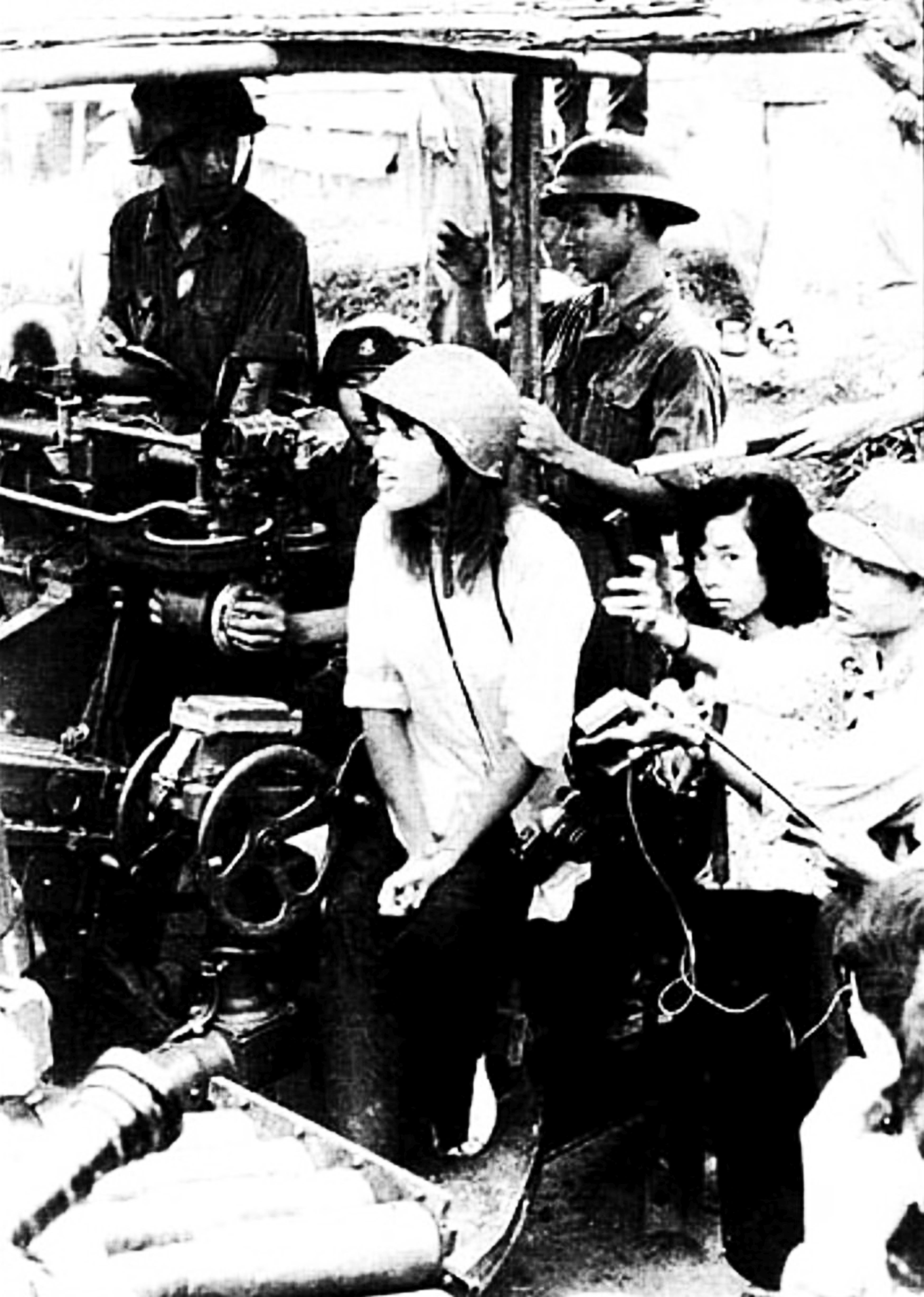There’s no denying that Jane Fonda is one of the most polarizing figures in American history. Her name brings up strong emotions, whether you view her as a fearless activist or someone who betrayed her country during a turbulent time. Today, we’re diving deep into the life and legacy of Jane Fonda, particularly focusing on the controversial label that has followed her for decades: "American Traitor." This isn’t just a gossip piece; it’s a comprehensive look at her actions, their consequences, and why this debate continues to rage on.
Jane Fonda’s story is more than just Hollywood glamour. It’s a tale of activism, politics, and the price of standing up for what you believe in. Whether you love her or hate her, her impact on American culture cannot be ignored. We’ll explore how her involvement in Vietnam War protests earned her the infamous nickname “Hanoi Jane,” and why it still resonates today.
This article aims to shed light on both sides of the argument, using credible sources and historical context to paint a clearer picture. By the end, you’ll have a better understanding of why Jane Fonda is seen as either a trailblazer or a traitor, depending on your perspective. So buckle up, because we’re about to dive into some pretty heated waters.
- Understanding The Family Life Of Marjorie Taylor Greene A Closer Look At Her Children
- A Celebratory Journey Aubreigh Wyatt Birthday
Who is Jane Fonda? A Brief Biography
Before we delve into the controversy, let’s take a step back and get to know Jane Fonda. Born on December 21, 1937, in New York City, she is the daughter of legendary actor Henry Fonda. Growing up in a family steeped in acting, it was only natural that she’d follow in her father’s footsteps. But Jane wasn’t just content with being a pretty face on the silver screen.
Data and Facts About Jane Fonda
Here’s a quick rundown of her life and career:
| Full Name | Jane Seymour Fonda |
|---|---|
| Birthdate | December 21, 1937 |
| Place of Birth | New York City, USA |
| Occupation | Actress, Activist, Author |
| Spouses | Roger Vadim, Tom Hayden, Ted Turner |
| Awards | Two Academy Awards, Three Golden Globes, and Multiple Honors for Activism |
As you can see, Jane’s life is packed with achievements, but it’s her activism that often overshadows her acting career. Let’s break down why that is.
- Molly Noitt A Journey Through Her Life And Career
- Unveiling The Life Of Molly Noblitt A Journey Through Her Story
Why Jane Fonda is Called an American Traitor
The nickname "American Traitor" stems from her vocal opposition to the Vietnam War in the 1970s. During this period, Fonda made several trips to North Vietnam, including a notorious visit where she was photographed sitting on an anti-aircraft gun. This image became a symbol of her alleged betrayal of U.S. troops stationed in Vietnam.
Her actions during this time were highly controversial, and many veterans felt betrayed by her public statements criticizing the war effort. However, Fonda has always maintained that her intentions were to bring attention to the injustices of the conflict and advocate for peace.
Key Moments That Sparked the Controversy
- 1972 Trip to Hanoi: Fonda traveled to North Vietnam to witness the effects of the war firsthand. She broadcast her anti-war sentiments on Vietnamese radio, which infuriated many Americans.
- Photographs with Vietnamese Soldiers: The images of Jane posing with Vietnamese military equipment were widely circulated and used as evidence of her betrayal.
- Public Criticism of U.S. Policies: Fonda openly condemned the U.S. government’s role in the war, calling out what she saw as unethical practices.
These moments cemented her reputation as a divisive figure, with supporters praising her bravery and detractors labeling her a traitor.
Understanding the Context: The Vietnam War Era
To fully grasp why Jane Fonda’s actions were so controversial, we need to understand the climate of the Vietnam War era. The late 1960s and early 1970s were marked by widespread protests against the war, with many Americans questioning the morality of U.S. involvement.
Fonda was part of a larger movement of activists who believed that speaking out was the only way to effect change. However, her methods and public statements made her a lightning rod for criticism, especially among those who supported the war effort.
The Impact on Veterans
One of the most significant criticisms of Fonda’s actions is how they affected Vietnam War veterans. Many felt that her words and actions undermined their sacrifices and contributed to the stigma they faced upon returning home.
However, it’s worth noting that Fonda has since reached out to veterans, apologizing for any harm caused and working to mend fences. This ongoing dialogue highlights the complexity of her legacy and the lasting impact of her activism.
Jane Fonda’s Activism Beyond Vietnam
While the Vietnam War remains the most contentious aspect of Fonda’s career, her activism extends far beyond that period. Throughout her life, she has been a vocal advocate for various causes, including women’s rights, environmental justice, and social equality.
Her commitment to these issues has earned her both praise and criticism, but there’s no denying her influence. In recent years, Fonda has become a prominent voice in the fight against climate change, proving that her passion for activism hasn’t waned with age.
Key Activism Highlights
- Women’s Rights: Fonda has long been a champion of gender equality, using her platform to promote women’s issues.
- Environmental Justice: Her involvement in climate activism has brought renewed attention to her legacy, showing that she’s still willing to take bold stands.
- Social Equality: From civil rights to LGBTQ+ advocacy, Fonda has consistently supported marginalized communities.
These efforts demonstrate that Fonda’s activism is rooted in a genuine desire for change, even if her methods sometimes spark controversy.
Public Perception: How Jane Fonda is Viewed Today
Over the years, public opinion of Jane Fonda has shifted. While she remains a polarizing figure, many have come to appreciate her courage and consistency in standing up for her beliefs. Others, however, still view her as an American traitor who betrayed her country during a difficult time.
Interestingly, younger generations tend to see Fonda in a more positive light, viewing her as a trailblazer who used her platform for good. This shift in perception underscores the evolving nature of history and how our understanding of past events can change over time.
Modern-Day Reactions
In recent years, Fonda has been more open about her past actions, acknowledging mistakes while standing by her principles. This honesty has helped bridge gaps with some of her critics, though others remain steadfast in their opposition.
It’s fascinating to see how social media has played a role in shaping modern perceptions of Fonda. Memes and viral posts often portray her as a complex figure, capable of both flaw and greatness.
Fact vs. Fiction: Debunking Myths About Jane Fonda
With any controversial figure, myths and misconceptions are bound to arise. Let’s separate fact from fiction when it comes to Jane Fonda:
- Myth: Jane Fonda was a spy for North Vietnam. Fact: There’s no evidence to support this claim. Her actions were largely symbolic and intended to draw attention to her anti-war stance.
- Myth: She personally harmed U.S. soldiers. Fact: While her words and actions hurt some veterans emotionally, there’s no proof of direct harm.
- Myth: She regrets nothing. Fact: Fonda has publicly apologized for any unintended consequences of her activism, showing a willingness to learn and grow.
These clarifications help paint a more nuanced picture of Jane Fonda and her legacy.
The Lasting Legacy of Jane Fonda
Whether you see Jane Fonda as a hero or a traitor, her impact on American culture is undeniable. Her willingness to speak truth to power has inspired countless activists, even as it has alienated others. This duality is what makes her such a fascinating figure to study.
As we move forward, it’s important to remember that history is rarely black and white. Jane Fonda’s story is a testament to the complexity of human nature and the importance of context when evaluating past actions.
Lessons We Can Learn
From Jane Fonda’s life, we can take away several valuable lessons:
- Speak Your Truth: Standing up for what you believe in can be difficult, but it’s essential for progress.
- Apologize When Necessary: Acknowledging mistakes and making amends is a sign of strength, not weakness.
- Stay True to Your Values: Consistency in your beliefs can help you weather even the toughest storms.
These principles are as relevant today as they were during the Vietnam War era.
Conclusion: Is Jane Fonda Really an American Traitor?
After exploring both sides of the argument, it’s clear that labeling Jane Fonda as an "American Traitor" oversimplifies a complex issue. While her actions during the Vietnam War were undoubtedly controversial, they were motivated by a genuine desire for peace and justice.
We encourage readers to think critically about history and its figures, recognizing that even the most polarizing individuals have layers worth exploring. By doing so, we can gain a deeper understanding of the world around us.
What do you think? Is Jane Fonda a traitor, a hero, or something in between? Let us know in the comments below, and don’t forget to share this article with your friends. Together, we can keep the conversation going!
Table of Contents
- Who is Jane Fonda? A Brief Biography
- Why Jane Fonda is Called an American Traitor
- Understanding the Context: The Vietnam War Era
- Jane Fonda’s Activism Beyond Vietnam
- Public Perception: How Jane Fonda is Viewed Today
- Fact vs. Fiction: Debunking Myths About Jane Fonda
- The Lasting Legacy of Jane Fonda
- Conclusion: Is Jane Fonda Really an American Traitor?
- Nastia Liukin A Journey Through Strength And Struggles
- Molly Niblet The Rising Star You Need To Know


